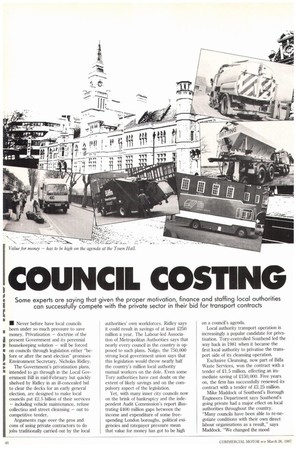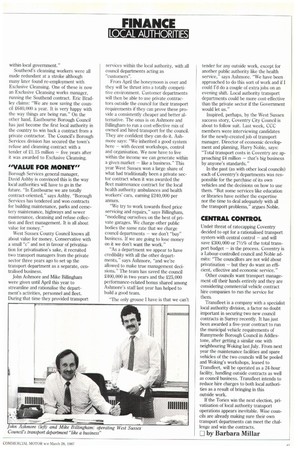COUNCIL COSTING
Page 42

Page 43

If you've noticed an error in this article please click here to report it so we can fix it.
I Some experts are saying that given the proper motivation, finance and staffing local authorities can successfully compete with the private sector in their bid for transport contracts
• Never before have local councils been under so much pressure to save III money. Privatisation — doctrine of the I present Government and its perennial p housekeeping solution — will be forced II on councils through legislation either "before or after the next election" promises : Environment Secretary, Nicholas Ridley.
pi The Government's privatisation plans, 11 intended to go through in the Local Gov Iernment Bill in mid-February but quickly shelved by Ridley in an ill-concealed bid to clear the decks for an early general election, are designed to make local councils put 22.5 billion of their services — including vehicle maintenance, refuse collection and street cleansing — out to competitive tender.
Arguments rage over the pros and cons of using private contractors to do jobs traditionally carried out by the local authorities' own workforces. Ridley says it could result in savings of at least 2250 million a year. The Labour-led Association of Metropolitan Authorities says that nearly every council in the country is opposed to such plans. Nalgo, the 750,000 strong local government union says that this legislation would throw nearly half the country's million local authority manual workers on the dole. Even some Tory authorities have cast doubt on the extent of likely savings and on the compulsory aspect of the legislation.
Yet, with many inner city councils now on the brink of bankruptcy and the independent Audit Commission's report illustrating PAW million gaps between the income and expenditure of some freespending London boroughs, political exigencies and ratepayer pressure mean that value for money has got to be high on a council's agenda.
Local authority transport operation is increasingly a popular candidate for privatisation. Tory-controlled Southend led the way back in 1981 when it became the first local authority to privatise the transport side of its cleansing operation.
Exclusive Cleansing, now part of Biffa Waste Services, won the contract with a tender of 21.5 million, effecting an immediate saving of 2150,000. Five years on, the firm has successfully renewed its contract with a tender of 22.25 million.
Mike Maddock of Southend's Borough Engineers Department says Southend's going private had a major effect on local authorities throughout the country. "Many councils have been able to re-negotiate conditions with their own direct labour organisations as a result," says Maddock. "We changed the mood within local government."
Southend's cleansing workers were all made redundant at a stroke although many later found re-employment with Exclusive Cleansing. One of these is now an Exclusive Cleansing works manager, running the Southend contract. Eric Bradley claims: "We are now saving the council 2640,000 a year. It is very happy with the way things are being run." On the other hand, Eastbourne Borough Council has just become the first local authority in the country to win back a contract from a private contractor. The Council's Borough Services division has secured the town's refuse and cleansing contract with a tender of £1.15 million — five years after it was awarded to Exclusive Cleansing.
"VALUE FOR MONEY"
Borough Services general manager, David Ashby is convinced this is the way local authorities will have to go in the future. "In Eastbourne we are totally contract-oriented," says Ashby. "Borough Services has tendered and won contracts for building maintenance, parks and cemetery maintenance, highways and sewer maintenance, cleansing and refuse collection and fleet management. It is all about value for money."
West Sussex County Council knows all about value for money. Conservative with a small "c" and not in favour of privatisation for privatisation's sake, it recruited two transport managers from the private sector three years ago to set up the transport department as a separate, centralised business.
John Ashmore and Mike Billingham were given until April this year to streamline and rationalise the department's activities, personnel and fleet. During that time they provided transport services within the local authority, with all council departments acting as "customers".
From April the honeymoon is over and they will be thrust into a totally competitive environment. Customer departments will then be able to use private contractors outside the council for their transport requirements if they can prove these provide a consistently cheaper and better alternative. The onus is on Ashmore and Billingham to run a cost-effective mix of owned and hired transport for the council. They are confident they can do it. Ashmore says: "We inherited a good system here — with decent workshops, control and organisation. We now have to Live within the income we can generate within a given market — like a business." This year West Sussex won a large share of what had traditionally been a private sector contract when it was awarded the fleet maintenance contract for the local health authority ambulances and health workers' cars, earning <£240,000 per annum.
"We try to work towards fixed price servicing and repairs," says Billingham, "modelling ourselves on the best of private garages. We charge other public bodies the same rate that we charge council departments — we don't "buy" business. If we are going to lose money on it we don't want the work."
"As a department we appear to have credibility with all the other departments," says Ashmore, "and we're allowed to make true management decisions." The team has saved the council £400,000 in two years and the 225,000 performance-related bonus shared among Ashrnore's staff last year has helped to build a good team, "The only grouse I have is that we can't tender for any outside work, except for another public authority like the health service," says Ashmore. "We have been approached to do this sort of work and if could I'd do a couple of extra jobs on an evening shift. Local authority transport departments could be more cost-effective than the private sector if the Government would let us."
Inspired, perhaps, by the West Sussex success story, Coventry City Council is about to follow suit. Last week, CCC members were interviewing candidates for the newly-created job of transport manager. Director of economic development and planning, Harry Noble, says: "Total transport costs in Coventry are approaching VI million — that's big business by anyone's standards."
In the past (as with other local councils) each of Coventry's departments was responsible for the purchase of its own vehicles and the decisions on how to use them. "But some services like education or libraries have neither the expertise nor the time to deal adequately with all the transport problems," argues Noble.
CENTRAL CONTROL
Under threat of ratecapping Coventry decided to opt for a rationalised transport system with central control — and will save 2300,000 or 71/2% of the total transport budget — in the process. Coventry is a Labour-controlled council and Noble admits: "The councillors are not wild about privatisation — but they do want an efficient, effective and economic service."
Other councils want transport management off their hands entirely and they are considering comniercial vehicle contract hire companies to run the service for them.
Transfleet is a company with a specialist local authority division, a factor no doubt important in securing two new council contracts in Surrey recently. It has just been awarded a five-year contract to run the municipal vehicle requirements of Runnymede Borough Council in Addlestone, after getting a similar one with neighbouring Woking last July. From next year the maintenance facilities and spare vehicles of the two councils will be pooled and Woking's workshops, leased to Transfleet, will be operated as a 24-hour facility, handling outside contracts as well as council business. Transfleet intends to reduce hire charges to both local authorities as a result of bringing in this outside work.
If the Tories win the next election, privatisation of local authority transport operations appears inevitable. Wise councils are already making sure their own transport departments can meet the challenge and win the contracts.
LI by Barbara Millar
















































































































